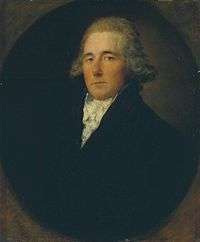Sir Henry Dudley, 1st Baronet
The Reverend Sir Henry Bate Dudley, 1st Baronet (25 August 1745 – 1 February 1824) was a British minister, magistrate and playwright. He was born in Fenny Compton, Warwickshire, but in 1763 his father moved the family to Essex to take up a Rectory at North Fambridge near Chelmsford. On his father's death, Bate Dudley took over the ministry.[2]

Bate Dudley was a great supporter of,[3] and chronicled the life of the artist Thomas Gainsborough . Much of this work was published in the Morning Herald which Bate Dudley owned and ran, and the Morning Post[4] with which he was also associated but had left to set up the Herald after a disagreement in 1780.[2] Much of this was republished in 1915 in Life of Gainsborough by William Whitley.[5]
After meeting James Townley and being influenced by his farce High Life Below Stairs[6] Bate Dudley started writing scripts for comic operas. Following his The Rival Candidates, his libretto for The Flitch of Bacon (1778) was the first of his collaboration with the composer William Shield, whom he assisted in bringing to prominence. The Shield and Dudley operas also included The Woodman (1791) and Travellers in Switzerland (1794), and were produced at Covent Garden.[2][7]
For a time, between 1804 and 1812, Bate Dudley moved from Essex to Ireland due to financial difficulties and took up a Rectory in Kilscoran and Kilglass. He returned to England in 1812 to take up a rectory in Willingham, Cambridgeshire.[2] In October of the same year he was created a baronet, of Sloane Street, Chelsea, in the County of Middlesex, and of Kilscoran House in the County of Wexford.[8]
Bate Dudley played a part in the suppression of the Ely and Littleport riots of May 1816.[9] These were part of a more widespread discontent which affected Norfolk, Suffolk, Huntingdonshire and Cambridgeshire. It had its roots in discontent over the enclosure of the fenlands, but the high price of bread, poor pay of agricultural workers, and unemployment of soldiers returning from the Napoleonic wars were also factors. Bate Dudley, who was a magistrate at Ely at the time, organised opposition to the rioters at Littleport, near Ely, where the insurgents were defeated, but only after troops opened fire on them.[10][11]
Comic operas
- Sir Henry Bate Dudley, The Rival Candidates, 1775.[12]
- William Shield, Sir Henry Bate Dudley, The Flitch of Bacon, 1779.[13]
- William Shield, Sir Henry Bate Dudley, The Woodman, 1791.[14]
- William Shield, Sir Henry Bate Dudley, Travellers in Switzerland, 1794.[15]
References
- "Sir Henry Bate-Dudley, Bart. circa 1780". Tate Collection. 2010. Retrieved 12 September 2010. Cite journal requires
|journal=(help)CS1 maint: ref=harv (link) - Obituary, 1824, pp. 273-276.
- Woodall, Mary The Letters of Thomas Gainsborough The Cupid Press, London, 1961
- "A Field Guide to the English Clergy' Butler-Gallie, F p159: London, Oneworld Publications, 2018 ISBN 9781786074416
- Whitley, p. 56.
- James Townley, High life below stairs: A farce of two acts. As it is performed at the Theatre-Royal in Drury-Lane, J. Newbery, 1759.
- "The Woodman, a new comedy", in The Lady's Magazine Vol 22 for 1791 (GGJ and J Robinson, London), pp. 151-53. See also Theodore Fenner, Opera in London: Views of the Press 1785-1830 (SIU Press, 1994), pp. 385-87.
- "No. 16663". The London Gazette. 31 October 1812. p. 2189.
- Johnson, C (1893), An account of the Ely and Littleport riots in 1816, Littleport: Harris & Sons, pp. 15, 19–20
- Obituary, 1824, pp. 638-639.
- Royle, p. 83.
- Sir Henry Bate Dudley, The rival candidates: a comic opera in two acts; As it is now performing at the Theatre Royal in Drury-Lane, printed for J. Williams, W. Wilson, J. A. Husband, R. Moncrieffe, T. Walker, C. Jenkin, and J. Hillary, 1775.
- William Shield, Sir Henry Bate Dudley, The flitch of bacon: a comic opera, in two acts, T. Evans, 1779. (Produced 1778)
- Sir Henry Bate Dudley, The woodman: a comic opera, in three acts; as performed at the Theatre-Royal, Covent-Garden, with universal applause, printed by T. Rickaby, for T. Cadell, 1791.
- See Fenner, Opera in London, pp. 385-87 (as above).
Bibliography
- s.n., "Obituary: Sir Henry Bate Dudley, Bart.", The Gentleman's magazine, pp. 273–276, 638–639, Vol. 135, 1824
- Edward Royle, Revolutionary Britannia?: reflections on the threat of revolution in Britain, 1789-1848, Manchester University Press, 2000 ISBN 0-7190-4803-6.
- William T. Whitley, Art of England 1821-1837, Read Books, 2007 ISBN 1-4067-5294-0.
| Baronetage of the United Kingdom | ||
|---|---|---|
| New creation | Baronet (of Sloane Street and Kilscoran House) 1812–1824 |
Extinct |